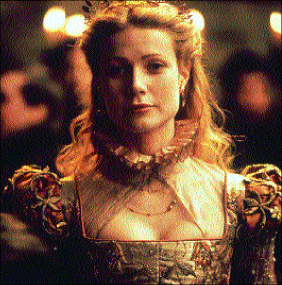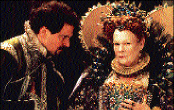CCT: How
did you enjoy the movie?
James Shapiro: I thought it was a terrific film. Even better than
what I was led to expect.
Coming
from your background as a Shakespeare professor, did the
screenwriters adhere closely to what we know factually about
Shakespeare's life?
This film did a brilliant job
re-conceiving something that was going on 400 years ago and making
it into a terrific romantic comedy. A couple things were really
intelligent about this movie. The writers use the year 1593, a very
complicated and interesting time in Shakespeare's life, about which
we know surprisingly little.
This is as
good as any biography of Shakespeare.
So it was a
deliberate choice to pick that year in which to set the
film?
Yes. This was at the tail end of the
"lost years." The writing of the script is great, because it fills
in the blanks. We know historically, at this point, he has to get a
large sum of money in order to become a shareholder in his acting
company; the plague is still a problem in London in 1593; and
around this time, he's writing Romeo and Juliet.
In the film,
Shakespeare, suffering from a terrible case of writer's block, gets
the inspiration to finish his play from his love, Viola. Did
Shakespeare have a muse?
There is a consensus that
Shakespeare got a lot better around the time he wrote Romeo and
Juliet. What inspired him? We don't know. A great love affair
is as good a theory as any.
What about
Christopher Marlowe? Were they rivals?
Shakespeare acted in Marlowe's
plays. They knew each other, and they knew each other's work
extremely well.
In the film,
Shakespeare "borrows" several of Marlowe's ideas for his play. Does
this historically hold true?
Yes, he was always borrowing. The
great thing is that in this movie you have Shakespeare walking
through the streets catching snatches of conversation that go right
into his plays.
Did Marlowe
really die at this point?
He died in 1593, at the age of 29.
He and Shakespeare were born the same year. He was killed under
mysterious circumstances, probably assassinated.
So, do you think
if Marlowe hadn't died, he would have been more famous than
Shakespeare?
Well, in 1593, Marlowe is the better
dramatist, hands down -- there is no question about it. Fame is
something else, however.
Did Shakespeare
ever act in his own plays?
Not leads. He played minor roles.
Perhaps he would have played the gravedigger in
Hamlet.
No, he never would have played
Romeo.

Gwyneth
Paltrow PHOTO: LAURIE SPARHAM
In the film,
Viola wants to be an actor so badly that she disguised herself as a
man in order to secure a part in Shakespeare's play. When were
women finally allowed to act?
Aristocratic women were acting in
courtly masques a decade later. As a general rule, not until 1660,
after the Restoration [of Charles II], did women act on the popular
stage.
Gwyneth Paltrow
won an Oscar for her portrayal of Viola, and Joseph Fiennes
received terrific reviews for his portrayal of the famous bard.
What did you think of their performances?
Some of their scenes from Romeo
and Juliet in this movie were better than anything I've seen on
stage. The intensity of these actors is better than anything I've
recently seen in the theater.
Dame Judi Dench
also won an Oscar for her eight minutes of screen-time as Queen
Elizabeth. What did you think of her performance?
Judi Dench was perfect. Her
portrayal was a snapshot of what I imagine Elizabeth was like. She
had the shrewdest personality. I loved when she says, "I know what
it's like to be a woman in a man's profession." It added a vital
political dimension to this movie.
Another Oscar
went to Tom Stoppard and Marc Norman for the screenplay. Did you
like their script?
Very much. There is a big challenge
is writing a movie in which Shakespeare's own words make up a large
part of the script. How do the screenwriters' own words not appear
dead compared to Shakespeare's? Norman and Stoppard really held
their own. Stoppard had already demonstrated his capability to do
this in his early play, Rosencrantz and Guildenstern Are
Dead. He does it again in Shakespeare in
Love.
So do you think
the film portrayed a plausible portrait of Shakespeare, the
man?
Even having spent decades of my life
teaching and writing about his career, especially his early work, I
can't say. But for me, this is as good as any biography of
Shakespeare. He must have had an emotional life, but how do you
give a sense of that emotional life when no trace of it survives
except for what we imagine we find in the words he puts in his
characters' mouths? You have to make it up a little bit.
Biographers don't like to do that, and, like most scholars, I don't
like it when they do. This movie did it in a very intelligent
way.
Julie Taymor has
just directed a film version of Titus Andronicus, and Kevin
Klein and Michelle Pfeiffer are starring in the film version of
A Midsummer Night's Dream opening this summer. Why is
Hollywood suddenly so interested in Shakespeare?
They're not paying for the rights,
and, in truth, he's a better storyteller than anyone in Hollywood
today.
The immense
success of Shakespeare in Love has propelled Shakespeare
back into the mainstream of popular culture. How has the
"Shakespeare boom" affected you as a historian and
professor?
The "Shakespeare boom" in the
classroom has been occurring probably for at least the last decade.
I've been teaching at Columbia since 1984 and the number of
students who want to study Shakespeare has been rising
steadily.

Colin Firth and Dame
Judi Dench
I remember the
crunch to get into one of your classes. If you didn't get to class
15 minutes early, you didn't get a seat.
When Ted Taylor or David Kastan or
Jean Howard or I teach Shakespeare, we usually have two or three
times the students who want to take it than can fit in the
classroom. This year, for the first time, we tried teaching two
lectures in the same semester, and they were both filled. I think
we're very fortunate as an institution given the number of
first-rate Shakespeareans that we have teaching here, and the
interest among our students is very exciting.
You also teach a
John Jay Colloquium for alumni on Shakespeare. How does teaching
alumni compare with teaching undergraduates?
I have been teaching an alumni
course on and off for the past five or six years, which is as
pleasurable as teaching undergrads at Columbia. In some ways, it's
more so, because I get to teach a half dozen plays in the course of
a semester to alumni who have seen the world and have helped shaped
it. Alumni have a hunger for Shakespeare, and they bring a unique
perspective and intelligence to the work. I am in an unusually
privileged position to teach both terrific undergrads and
alumni.
It must be
exciting to teach so many generations of Columbia students. Do you
find that young alumni bring a different perspective to the work
than more mature alumni?
You know, I've never taught a
colloquium specifically for young alumni, but I think it's a
terrific idea. I was always told, and I'm beginning to believe,
that Shakespeare is wasted on the young, but maybe the recent
graduates are in an ideal position, having been out a few years in
the real world, to appreciate these plays and re-connect with their
Columbia education. We offer a tremendous intellectual experience
at Columbia, and I think a lot of people only recognize the nature
of that experience after they graduate. As an alumnus myself, I
know this. Shakespeare in film is exciting, but there is no
substitute for sitting down with a lot of smart people and reading
Shakespeare. I think this Shakespeare boom could provide a
wonderful opportunity for more alumni and professors to sit down
and share in this kind of intellectual exchange. It's what Columbia
does best.
RITA PIETROPINTO'S "MOVIE AND A
DINNER" IS A REGULAR FEATURE ON MOVIEFONE'S WEBSITE (WWW.MOVIEFONE.
COM), DARA-LYNN WEISS '92, CREATIVE DIRECTOR. PHOTOS FROM
SHAKESPEARE IN LOVE, COURTESY OF MIRAMAX FILMS.
|